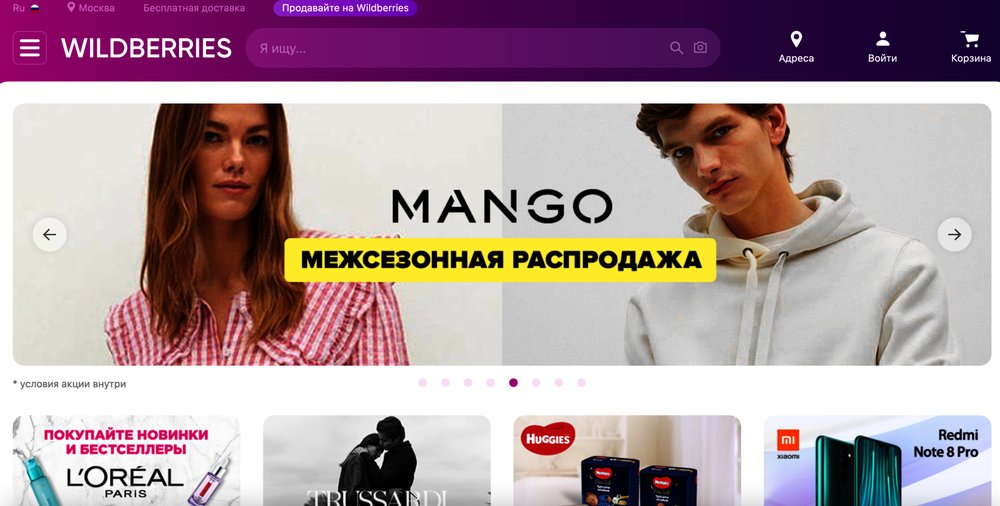AFP
Mar 31, 2021
Kristina draws closed the purple curtain of the changing room at her nearest Wildberries location, emerging moments later to twirl in
a black dress with the label still attached.

But the 42-year-old housewife is not at one of Moscow's department stores.
Rather she is at the local branch of a Russian e-commerce giant whose steady rise to the top was built largely on physical locations uncharacteristic of a leading online retailer.
Founded in 2004 by a teacher on maternity leave, Wildberries carved a lucrative niche by allowing customers to try out their orders at pick-up points and pay only for items they take home.
"I haven't decided yet what to keep," says Kristina, eyeing the dress in a mirror at the collection point.
At this location in central Moscow, a steady stream of customers enter, flash a code on their phones to receive packages from an attendant and duck into changing booths.
The system has made Wildberries Russia's e-commerce leader in sales and pushed it into the European market.
Even though Russia's economy has been sluggish in recent years, e-commerce is booming.
Boosted by the coronavirus pandemic, Wildberries' sales grew 74 percent to $6 billion last year.
The company registered nearly 324 million orders in 2020 -- nearly 1.6 million products per day -- doubling the number of 2019.
There is a rush of new players in the market and even though growth has been explosive after starting at almost zero, there is still plenty to play for.
In another example of the success of Russian e-retail, the Ozon group recently raised more than $1 billion on Wall Street and promises further expansion across Russia.
Russian brands
The success of Wildberries at home earlier prompted its expansion to former Soviet countries.
But now -- in a rare move for a Russian company -- it has also recently launched in Germany, Poland, Italy, France and Spain.
"Customers will receive a quality product at an affordable price and fairly quickly," Vyacheslav Ivashchenko, director of development, told AFP at the company's Moscow offices.
"We are now in 13 countries and intend to continue expanding."
While delivery in Russia takes one or two days via a localised warehouse system, European deliveries will take about a week.
They will be made either at collection points or at home, with the booth-system currently only available at 9,200 locations in the former Soviet Union.
But the products on offer will be the same -- from mid-range clothing and kitchen accessories to sex toys, cosmetics and household goods.
That variety is Wildberries' competitive advantage, says Ivashchenko.
"We offer both big international brands and Russian brands -- like homemade mittens, felt boots ... it'll be attractive both for Europeans and Russian emigrants."
By a woman for women
In the e-commerce landscape, Wildberries stands out with its pink and purple logo and its clientele made up of 70 percent women, who often make purchases for the whole family.
But above all, it stands out for its founder and managing director Tatyana Bakalchuk.
A former English-language teacher, the self-made woman and mother of four started the company while on maternity leave.
"We had a one-month-old baby and I wanted to start working again so as not to feel like just a mother," she said in one of her first interviews in 2018.
Describing herself as "introverted", she now tops the Forbes list of Russia's richest women with an estimated net worth of $12.6 billion.
"My starting capital was my work and my family -- (their) support," said Bakalchuk, who began the business by ordering products from the 3 Suisses and Otto catalogues and reselling them in Russia.
As the company expanded, she proposed an innovative idea for Russia: charging only once orders had been picked up to combat the mistrust of Russian consumers accustomed to scams.
Today her company has 40,000 employees.
At the collection point in southeastern Moscow, Lyudmila, 36, came by. She works next door and had loaded up on cleaning products and kids' toys.
Lyudmila says she places orders once a week and hardly ever visits other stores.
"What's really practical is that you can order everything from one place -- even coffee."
